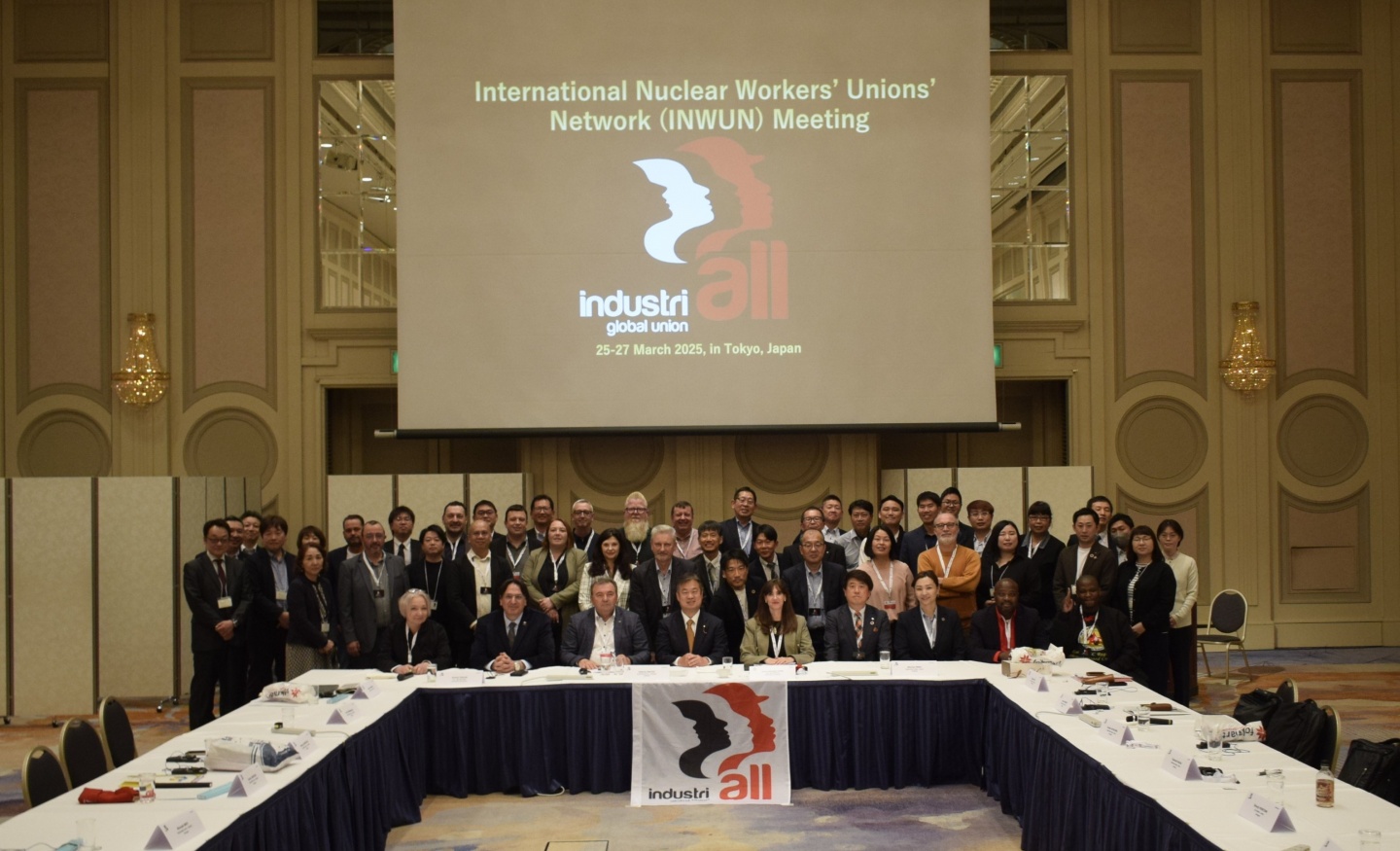Nuclear renaissance raises worker and safety issues
in the context of growing geopolitical instability, energy transformation and social pressure to accelerate decarbonisation, the International nuclear workers' union network (INWUN), coordinated by IndustriALL Global Union, held its global meeting in Tokyo, Japan, on 25 March.
The meeting served as a platform to assess the current state of the nuclear sector internationally and to reinforce the role of trade unions in shaping a just and secure energy transition.
In her opening remarks, IndustriALL's energy director Diana Junquera Curiel presented an overview of the global energy landscape, noting that fossil fuels still dominate energy production despite the growth of renewable sources. Nuclear energy, she said, is gaining renewed interest in several countries due to its potential to deliver low-emission and reliable energy, although it raises significant labour and social challenges.
Recent momentum in nuclear development was highlighted, with a mid-March pledge by a cross-industry group-including Google, Amazon, Meta, 14 global financial institutions, 140 nuclear companies, and 31 countries-supporting a tripling of global nuclear capacity by 2050. This shift is expected to meet increasing electricity demand, particularly from energy-intensive data centres.
Kazuo Kawano of Japanese union DENRYOKU SOREN presented Japan's approach to restarting reactors under stricter safety standards, while working to rebuild public confidence following the 2011 Fukushima disaster. Japan is also investing in next-generation nuclear technologies and restoring its nuclear supply chain.
DENRYOKU SOREN president Moriya Mibu welcomed the international participation and noted the value of the exchange, which included a site visit to Fukushima Daiichi nuclear power station.
"Nuclear power is a technology that should be handled by democratic and human rights-oriented people,"
he said, emphasising the importance of maintaining international union dialogue.
The Ukrainian delegation reported on the brutal impact of war; occupied facilities, kidnapped workers, drone attacks and continuous violations of international standards. Despite the conditions, Ukrainian unions continue to operate and represent workers.
Valery Matov, co-chair of IndustriALL's nuclear sector, said:
"We have received confirmation that the nuclear sector is experiencing a new renaissance, and it is very important to enhance the exchange of information between us, taking into consideration the current global situation. We would also like the uranium sector to receive a new boost for development. Many thanks to IndustriALL and our Japanese colleagues for this high-level meeting."
Country presentations revealed diverse issues across regions:
- Argentina reported concerns over privatisation threats, halted strategic projects such as RA-10 and CAREM, and erosion of technological sovereignty.
- France highlighted its nuclear revival, citing upcoming projects like the EPR2 and SMRs. The sector is expected to hire 100,000 workers by 2034, with unions calling for stronger protections around working conditions, training, and union representation.
- Mongolia outlined new regulatory frameworks to support peaceful nuclear development, leveraging its uranium reserves to attract international investment.
- South Africa addressed the complexity of replacing coal with cleaner, more reliable sources like SMRs.
- The United Kingdom reported a critical shortage of skilled labour, projecting a need for 160,000 workers by 2043. Funding gaps in decommissioning efforts are raising concerns around safety and job stability. Unions are demanding a national skills strategy and supply chain support.
- Spain reaffirmed its scheduled plan to close all nuclear reactors between 2027 and 2035. However, power companies are lobbying for extensions, warning of potential electricity price hikes of up to 23% for households and 35% for industry if closures proceed as planned.
ANNIVERSARY OF FUKUSHIMA NUCLEAR ACCIDENT
On 26 March, delegates visited the Great East Japan earthquake and nuclear disaster memorial museum in Fukushima and later stayed at J-Village, a sports complex repurposed as a nuclear response base following the 2011 disaster. The site has since been restored and symbolises regional recovery.
The following day included a technical visit to the Fukushima Daiichi plant, where experts detailed ongoing decommissioning efforts, including waste management, contaminated water treatment, and the challenge of removing melted nuclear fuel-an unprecedented process expected to take 30 to 40 years. Approximately 880 tonnes of melted fuel remain inside reactors 1, 2, and 3.
The meeting closed with a call to expand the INWUN network, include uranium mining unions, and strengthen collaboration between meetings. Health and safety, youth training, and support for workers affected by plant closures were identified as urgent priorities.
Press release distributed by Pressat on behalf of Pressat Wire, on Thursday 27 March, 2025. For more information subscribe and follow https://pressat.co.uk/
Manufacturing, Engineering & Energy
You just read:
Nuclear renaissance raises worker and safety issues
News from this source:



